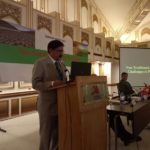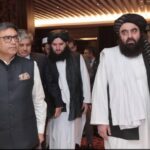ISLAMABAD, Pakistan: The National Security Advisor of Pakistan Lt. General (retd) Nasser Khan Janjua on Wednesday underlined the importance of spending and investing in the people if they really wanted a State that could bridge social fault lines and live in harmony.
“We have to improve social security of people to build a stronger Pakistan. We have to revamp the system if a common man is not feeling equality,” the adviser said in his address at a Seminar titled “Non-Traditional Security Challenges to Pakistan” organized by the Institute of Strategic Studies Islamabad (ISSI) at Marriott Hotel in Islamabad.
While emphasizing on investing on education of children in individual as well as in State capacity, Nasser Janjua said proud nations invested on human resources and utilized natural resources carefully by considering that those natural resources were for the generation to come.
“My father was a poor man, he invested on my education and now he a proud man,” Nasser Janjua said citing his own personal experience.
The adviser said the population growth must be bridged with growth of resources for providing equality to the people.
“From police reforms to educational reforms and from security to food and water….. We have to work at many fronts,” he was of the view.
However, he added, in a bid to overcome all problematic issues, collective approach was need of the hour.
Nasser Janjua said insurgency-hit Balochistan had been suffering a lot of issues including illiteracy, causing social imbalance in the Country’s largest province.
“But we fought and won hearts of the Baloch people,” he said, adding Balochistan was a story of winning of hearts by providing respect and feeling of equality among the people.
The national security advisor said earlier sense of deprivation was one of the biggest concerns for the Baloch people that helped ills to flourish. He said Pakistan as a State must provide same opportunities equally to every Pakistani to generate strong nationalism against dangerous sub-nationalism. “Nationalism need equality,” he maintained.
Shedding lights on ‘Non-Traditional Security Challenges to Pakistan’, Nasser Janjua said non-traditional threats usually brought traditional threats as both overlapped each other. He said if a State was weaker in economy than it invited others to exploit.
“If the society has poverty than social fault lines increase and those are exploited by enemies,” the advisor said.
The national security advisor was of the view that traditional threats were essentially linked with borders while non-traditional threats broke States from inside. He said non-traditional challenges were threats – not merely a State suffered – rather sometimes they expanded to an entire region.
Nasser Janjua said non-traditional challenges and threats were interlinked, and described the former much more intimidating as compared to the latter.
Furthermore, the advisor said canvass of national security was to watch and keep a constant eye on all traditional and non-traditional threats.
The advisor was of the view that a State could only be called secured if it could preserve its sovereignty, territorial integrity and freedom along with its people. He said the contemporary notion of security was not merely focused on sovereignty and territorial integrity; rather, it also primarily encompassed on the values, freedom, well-being and security of its people.
“If the people are not secure than how a Country will be secure?” he questioned. “We need to provide security to everyone to make the State secure including security from poverty and hunger,” he added.
Nasser Janjua further said national security was also linked with global and regional circumstances. Therefore, he added, they all needed to secure and maintain balance in natural resources within their region.
“If you fail to comprehend threats being faced by the region then it would harm your Country later or sooner,” he remarked.
The advisor also said in different blocs of power, the position of a Country was another important outlook. He said an image of a Country worldwide, its recognition as a safe Country, and its level of water and food preservation actually determined the traditional security and behaviour of other powers towards that particular Country.
In addition to that, Nasser Janjua added, political stability also guaranteed national security. He said certain questions such as; How many political parties and political leaders you have? Who carry the federation? Have your political parties reduced to regional/provincial character only? Do you have simmering sentiments like Pushoonistan, Azad Balochistan, Sindhu Desh? What is your political culture? Do you respond politically or militarily? and devolution of powers by the Centre to the Provinces (as guaranteed in 18th amendment in Pakistan’s 1973 Constitutions) were political determinators with regard to a Country’s national security.
Nasser Janjua said level of governance, level of implementation of law, and level of interaction among State apparatus also determined traditional and non-traditional security.
However, he cautioned, the population growth and growth of resources gap was widening with every passing day. He said the population boom needed a growth boom but they were lacking in it, and which would eventually cause illiteracy, poverty, drugs, and other social crimes.
Nasser Janjua said poverty always expanded fault lines in the society while religious intolerance, sectarianism and radicalisation could bring terrorism, adding unfortunately they had already been facing the menace in their society.
The national security advisor further said likewise environmental degradation, water management and its ill-planned usage were immediate threats they had been facing.
“We are misusing resources given by The God to us and we would responsible for consequences,” the advisor concluded.







